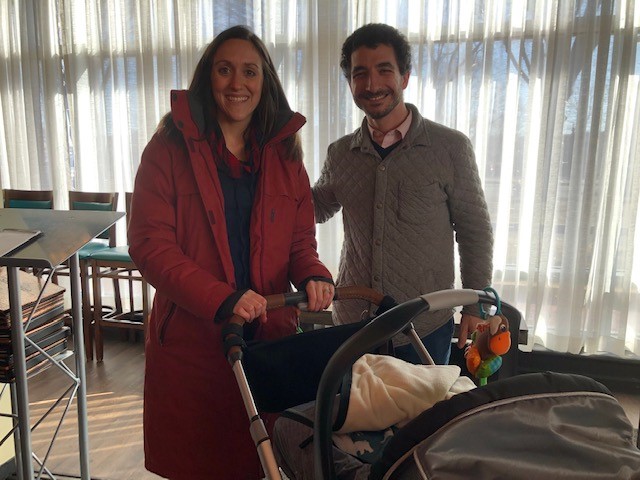Announcements & News
In the News: Relation of Oral Bisphosphonates to Bone Marrow Lesion Volume among Women with Osteoarthritis
In the News - Tuhina Neogi publication - Bone drug may be beneficial in the treatment of OA
Ballal, P., et al. (2020) The Relation of Oral Bisphosphonates to Bone Marrow Lesion Volume among Women with Osteoarthritis. Osteoarthritis and Cartilage.
"When we looked at those who had bone marrow lesions at baseline, we found that the women who started bisphosphonates had had more bone marrow lesions that decreased in size than the women who did not start bisphosphonates. These results suggest that bisphosphonates do not appear to be harmful, at least over one year, and perhaps may even help decrease bone marrow lesions in those that have them."
Tuhina Neogi, MD, PhD, corresponding author, Professor of Medicine and Epidemiology at Boston University Schools of Medicine and Public Health
Tuhina Neogi on COVID19 on AxiosEvents
WEDNESDAY JULY 22 AT 12:30 pm ET:
AxiosEvents interviews Dr. Neogi on The State of Chronic Pain in COVID19.
Click here to watch the interview.
Boston MCRC Pilot Grant RFA
Boston Musculoskeletal Clinical Research Collaboratory, a NIAMS funded CCCR, is delighted to announce a Request for Applications (RFA) for Pilot Project Grants for September 1, 2020.
Information and Forms can be found on the Boston MCRC website
Rheumatology Winter Holiday Party
In the News: Tuhina Neogi on updated Guidelines for Management of Patients with Gout
New recommendations for the management of patients with gout were presented in draft form at the 2019 American College of Rheumatology (ACR) Annual Meeting. The ACR Practice Guidelines Committee determined that it was necessary to update the 2012 version of the guidelines, based on new evidence from clinical trials. The new guidelines are currently under peer review and the committee is hoping to have them published sometime in 2020.
Andreea Bujor receives RRF Investigator Award with the Malawista designation
 Dr. Andreea Bujor, Assistant Professor in Rheumatology, has received a 3-year Investigator Award from the Rheumatology Research Foundation.
Dr. Andreea Bujor, Assistant Professor in Rheumatology, has received a 3-year Investigator Award from the Rheumatology Research Foundation.
Andreea’s research, titled “The role of myeloid Fli1 in organ fibrosis in scleroderma,” will address an unanswered question regarding scleroderma heart fibrosis: whether monocytes/macrophages contribute to the disease pathogenesis. The study systematically examines the contribution of the decrease transcription factor Fli1 in monocytes/macrophages to fibrosis in vivo and in vitro.
This analysis will determine whether future treatments in scleroderma, including treatment for scleroderma cardiomyopathy, should target Fli1 and the myeloi system, thus providing the basis for potentially safer, more effective therapies.
Annually, the Foundation’s Scientific Advisory Council chooses an outstanding recipient to receive the Malawista designation. We are excited to announce that Dr. Bujor has been named the recipient of the Tobé and Stephen E. Malawista, MD, Endowment in Academic Rheumatology. You can read more about this endowment here.
In the News: Tuhina Neogi in Medical Xpress
December 11, 2019
Concerns about other painkillers contributed to opioid crisis, study finds

Patients with chronic pain caught between cardiovascular concerns about non-opioid analgesics and addiction risks of opioids, likely causing significant unmet need for pain relief.
In the News: Tuhina Neogi in RheumNow
A Role for SGLT2 Inhibition in Gout?
By MedPage Today | 17 December 2019
The antidiabetic medication canagliflozin (Invokana) lowered serum urate and reduced the risk of gout flare in a post-hoc analysis of data from two large clinical trials.
In the CANVAS clinical trial program, which was funded by Janssen Research & Development and included more than 10,000 patients, the percentage difference in serum urate reduction with canagliflozin versus placebo was 6.7% (95% CI -7.3 to -6.1), according to Bruce Neal, MBChB, PhD, of the University of Sydney in Australia, and colleagues.
In addition, the likelihood of a gout flare or the initiation of treatment for gout was halved in patients treated with canagliflozin, with a hazard ratio of 0.53 (95% CI 0.40 to 0.71, P<0.0001), the researchers reported online in The Lancet Rheumatology.
“This agent appears to show potential for being a dual-benefit gout therapy, lowering serum urate and providing potential flare prophylaxis and thereby potentially reducing the need for separate flare prophylaxis with agents that are often contraindicated or poorly tolerated in patients with gout,” wrote Tuhina Neogi, MD, PhD, chief of rheumatology at Boston University School of Medicine, in an accompanying comment.
In the News: Tuhina Neogi in MDedge | Rheumatology
Updated gout guidelines: Don’t let kidney function dictate allopurinol dosing

Dr. Robert Simms announces his retirement
Dr. Robert Simms announces his intention to retire from Boston University School of Medicine
 Dr. Robert Simms of the Section of Rheumatology in the Department of Medicine has announced his intention to retire in March, 2020. Dr. Simms has served as faculty in the School of Medicine, the Department of Medicine, and the Section of Rheumatology with distinction for 35 years. During this time, he has made important contributions to the fields of rheumatology and scleroderma locally, nationally and internationally.
Dr. Robert Simms of the Section of Rheumatology in the Department of Medicine has announced his intention to retire in March, 2020. Dr. Simms has served as faculty in the School of Medicine, the Department of Medicine, and the Section of Rheumatology with distinction for 35 years. During this time, he has made important contributions to the fields of rheumatology and scleroderma locally, nationally and internationally.
Dr. Simms has spent virtually his entire career at BUSM, beginning as a Rheumatology Fellow in 1985, Assistant Professor in 1988, Associate Professor in 1996 and Professor in 2001. From 2005 to 2008, he served as Acting Rheumatology Section Head and then from 2008 to 2018, Section Head. He has had a career-long commitment to
the growth and success of the Rheumatology Section, serving as Clinical Director and Fellowship Program Director for many years before becoming Section Head. His guiding principle for the most successful center of disease investigation was the creation of a highly collaborative environment which included both basic and clinical investigators under one roof. This model has remained a highly productive template for the Scleroderma Center at Boston University, which has become among the largest and most successful scleroderma centers both nationally and internationally.
In the Department of Medicine, Dr. Simms has served on the Clinical Directors Committee, the Gastroenterology Search Committee and the Promotions Committee. Most recently, he helped facilitate the successful merger of Rheumatology and Clinical Epidemiology under the new leadership of Dr. Tuhina Neogi. In addition to serving on many national committees for the American College of Rheumatology, he co-chaired the first Practice Guideline Committee publishing widely influential, evidence-based guidelines for the management of rheumatoid arthritis. In recognition of his leadership in the field, Dr. Simms was awarded the Marion Ropes Award by the Arthritis Foundation.
In the field of scleroderma, Dr. Simms has made influential contributions in advancing novel treatment and understanding of the condition. Among them is the development of outcome measures to facilitate clinical therapeutic trials, the role of autologous transplantation and the development of successful disease modifying therapies. Seminal contributions have also included his role as a steering committee member and co-investigator in a serial of pivotal treatment studies establishing the critical role of immunosuppressive therapy in slowing the rate of disease progression (Scleroderma Lung Studies I, II and III). As a result of these studies, mycophenylate mofetil has emerged as a new standard of care in treatment of the disease. A BU team of scleroderma investigators including Dr. Simms and headed by Dr. Lafyatis showed that a novel monoclonal antibody therapy directed at TGFβ improved clinical measures of disease and biomarkers of fibrosis.
Dr. Simms has also played an additional international role in the World Scleroderma Foundation on its Scientific Advisory Board; this organization facilitates education and research throughout the world.
In recognition of his career-long commitment to excellence in the clinical care, research and education of scleroderma, Dr. Simms was awarded the prestigious Lifetime Achievement Award by the Scleroderma Foundation.
We will have ample opportunities to thank Dr. Simms for his decades of service and to recognize his contributions through March 2020.
















